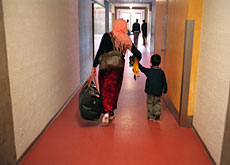Asylum policy “disregards rights of children”

The needs and wellbeing of children are too often overlooked when implementing the asylum and foreigner law, according to a report presented in Bern on Tuesday.
The monitoring body for the rights of asylum and alien law said that children’s rights were being pushed aside by a “restrictive” immigration policy.
“Children’s rights are in a bad way,” said Yvonne Zimmermann, director of the organisation.
Switzerland, despite having ratified the United Nations Convention on the Rights of the Child (CRC), has consistently failed to pay it much heed, the report added.
For example, when families are separated because a mother or father is forced to leave the country, far-reaching consequences for the children are seen as “collateral damage”.
Ruth-Gaby Vermot-Mangold, organisation president and a parliamentarian from the centre-left Social Democratic Party, said the report showed where official action clashed with children’s rights.
“If families receive assistance only in emergencies, that doesn’t include the provision of healthy food. This contravenes article 24 of the CRC, under which children have the right to the highest standard of health,” she said.
Zimmermann said the CRC was also contravened when children who have grown up in Switzerland and are well-integrated are forced to move to another country with which they have no connection.
She said this reflected the fact that foreign children lack rights that Swiss children take for granted – and are therefore discriminated against.
Cantons’ decision
Jonas Montani of the Federal Migration Office rejected the accusation.
“The new foreigners law – under which rejected asylum seekers who refuse to leave the country face detention – has been in force since January 1, 2008, but between then and the middle of 2009 not one person under 15 was taken into custody,” he told swissinfo.ch.
“The basic position is that minors follow their parents – their stay [in Switzerland] is dependent on their parents’ permits. But children aged 14-17 who have spent a large part of their adolescence in Switzerland and are well integrated will be tested specially.”
Montani explained that an article in the foreigners law says the subsequent immigration of family members may be approved if important familial reasons can be presented.
“It’s important to point out however that it’s not the Federal Migration Office that decides whether people should be deported but rather the cantons.
“We issue instructions to the cantons which explicitly refer to the Convention on the Rights of the Child and the European Human Rights Convention, which is binding for Switzerland.”
Lack of awareness
Susanne Meier, a lawyer from the Swiss Children’s Advocacy organisation, said the main problem is that children aren’t aware of their rights.
“Often no one listens to the children – instead a case is considered from the parent’s point of view,” she said.
Vermot-Mangold said children are seen only as an accessory – “and not as individuals, as the convention demands”.
She pointed out that the federal constitution also provides for the protection of the integrity of children and teenagers and for the promotion of their development. However, the children of asylum seekers and migrants are deprived of these guaranteed rights.
“Children should not become victims of a restrictive immigration policy. The CRC should not only be observed but consistently implemented in the decision-making process.”
The report was based on cases collected in western and eastern Switzerland and in the Italian-speaking canton of Ticino. Zimmermann admitted that while it was not representative – certain issues came up more frequently in some regions than in others – it nevertheless highlighted problem areas.
Harsher measures
The monitoring body for the rights of asylum and alien law was created after a referendum in September 2006 in which Swiss voters approved tougher regulations on asylum and limited immigration for citizens from outside the European Union.
Two-thirds of voters were convinced by the government’s arguments that harsher measures against asylum abuses were necessary to avoid social tension and provide protection for those fleeing persecution.
A coalition of centre-left parties, trade unions, churches and aid organisations had forced the vote, arguing that the reforms went against Switzerland’s humanitarian tradition. They added that the new law, approved by parliament in 2005, would make the country’s rules among the most restrictive in Europe.
The aim of the body is to observe the application of the law and to document problematic cases.
Thomas Stephens, swissinfo.ch
The industrialised countries that lodged the most asylum applications in 2007 were:
The United States: 49,200
Sweden: 36,200
France: 29,900
Canada: 28,300
Britain: 27,900
Greece: 25,110
Germany: 19,160
Italy: 14,050
Austria: 11,880
Belgium: 11,120
Switzerland was in 11th place with 10,390 – 1,561 of which were positive.
Some 16 per cent of asylum-seekers came from war-torn Eritrea, with 1,662 applications. It was followed by Serbia, with 953 requests, Iraq, Turkey and Sri Lanka.
Switzerland faces similar migrant challenges to those of other countries in Europe. In recent years it has received large numbers of asylum seekers, the majority of whom do not qualify for refugee status or residence in Switzerland.
In September 2006 two-thirds of voters backed new laws on immigration and asylum, which the government said were necessary to make Switzerland less attractive and to curb abuses. It was the ninth time since 1984 that Switzerland’s asylum law had been amended.
As a result asylum seekers who cannot produce identity papers within 48 hours without a credible reason have been automatically excluded. Rejected asylum seekers are barred from regular welfare benefits and qualify only for food and shelter.
Rejected asylum seekers who refuse to leave the country face detention of up to two years.

In compliance with the JTI standards
More: SWI swissinfo.ch certified by the Journalism Trust Initiative















You can find an overview of ongoing debates with our journalists here . Please join us!
If you want to start a conversation about a topic raised in this article or want to report factual errors, email us at english@swissinfo.ch.